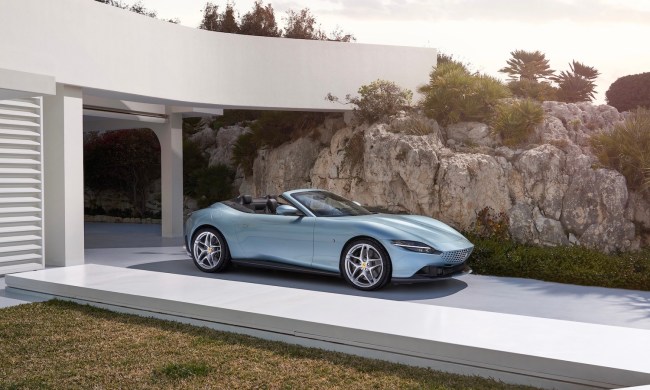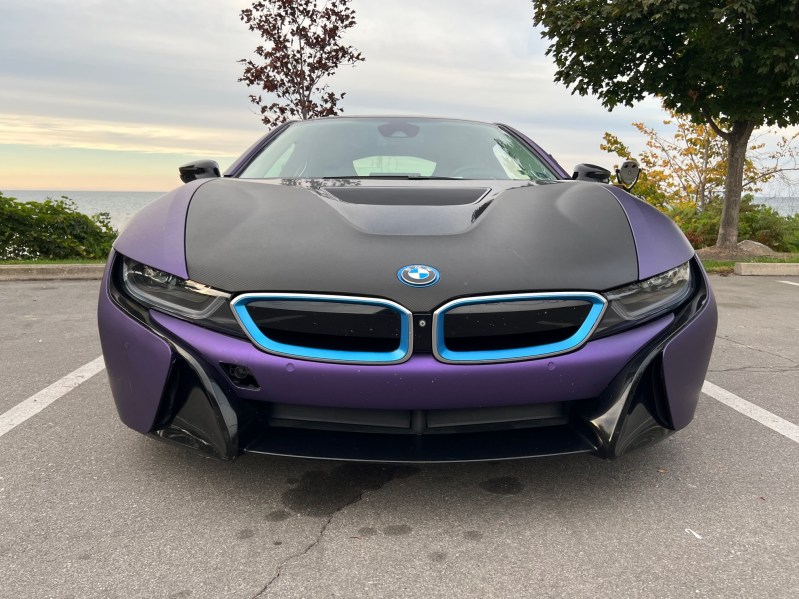
The idea of synergy is a little elusive to grasp at first. How can one plus one equal more than two? As we’ve seen in recent years with the wave of EV cars and trucks propagating our highways and byways, technology has a way of advancing exponentially quickly, and with those changes can come advantageous conjunctions of what were once very separate entities… which leads us inexorably into the driver’s seat of the future, behind the wheel of the incredible, and incredibly complex, BMW i8.
In the name of automotive science, when we were offered VIP tickets to a concert in Niagara Falls, it seemed the perfect opportunity to grab the keys to this beautifully complicated violet vixen and see firsthand what it is like piloting BMW’s halo car, nearly 1,500 miles to and from our humble New Jersey abode… and the i8 did not disappoint.
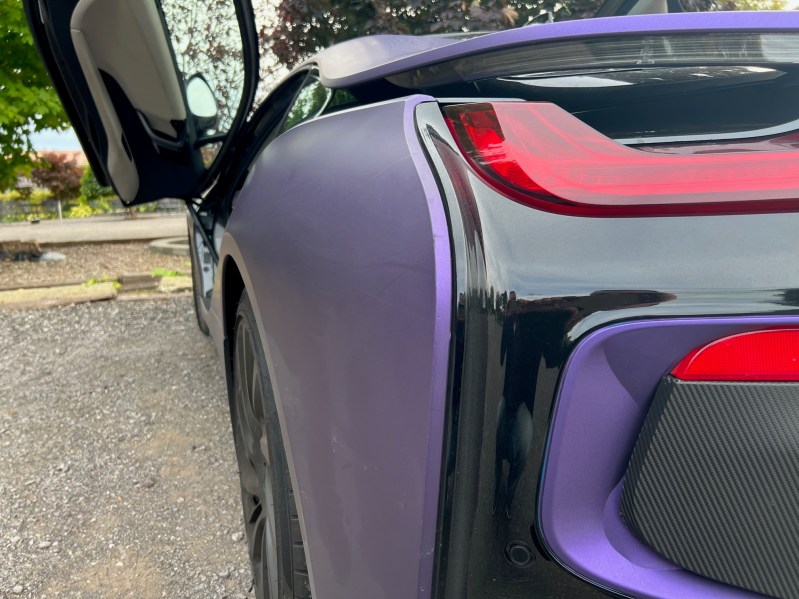
What is the BMW i8?
In essence, the i8 was BMW’s answer to a few lingering questions that surfaced around the early 2010s. Up until around 2012, the idea of a hybrid was dictated by the Toyota Prius, which was to say they were unique, extremely fuel-efficient, slow-moving, and of questionable aesthetic appeal. But then the world watched with awe and sadness as the seductively exciting Fisker Karma came and went in 2012. Amidst all this, the upstart company Tesla debuted its limited-edition Roadster, which felt more like a one-off experiment until the Model S debuted in 2013.
Having watched all this from the sidelines, by 2013, BMW had brought the ActiveHybrid 7 in 2010 and the fully-electric i3 in 2013. But BMW wanted to show the world that ‘hybrid,’ ‘beautiful,’ and ‘fast’ didn’t all have to be mutually exclusive ideas when driving into the future of the autoverse. So, Bimmer challenged their designers and engineers to create the Ultimate Hybrid Driving Machine, and the i8 is the sum total of all those keystone ideals infused with the car company’s ethos, which has been built on the idea of controlled exhilaration.
Being an automotive purist, your humble author has always been a fan of the traditional stick shift, naturally aspirated engines (preferably of the eight-cylinder variety), with minimal interference from computer-aided electronic nannying. Yet, there was something about the i8 that was intoxicatingly alluring. Sure, its low-slung, futuristic spacecraft looks probably had something to do with it. Or perhaps the enchantment of factory butterfly doors, which are a hallmark of the exotic, also added something to the mix. But mostly, after almost 1,500 miles of driving, it might just be that the EV future that seems inevitable doesn’t feel quite so bleak behind the wheel of this car.
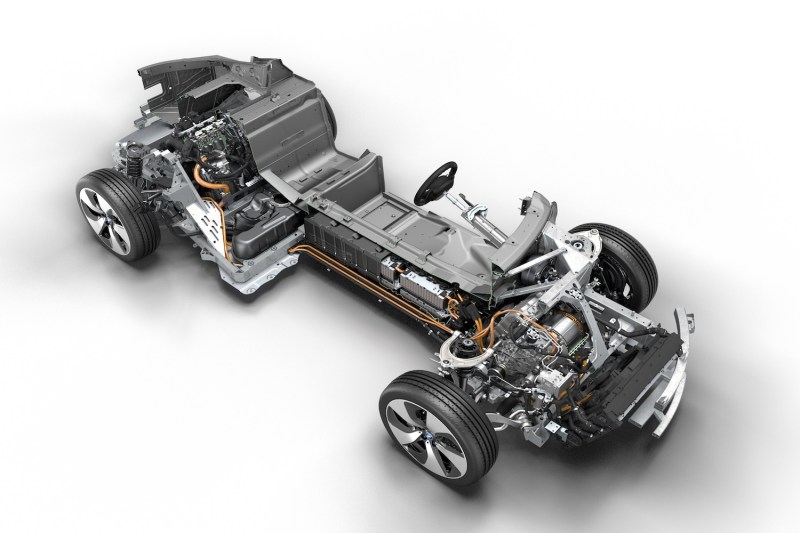
What engine does the BMW i8 have?
While the i8 does have a traditional engine, that is just the beginning of the power and fun. Starting from the nose of the car, we first find a front-mounted electric motor borrowed from the i3, which produces an impressive 141 horsepower and 184 pound-feet of torque that gets funneled through a two-speed transmission and powers just the front wheels. If in the proper mode (more on that later), the i8 can be used as a fully electric, front-wheel drive vehicle for up to 20 miles, at least up until 75 mph, or until the full throttle is engaged, whichever comes first. While this EV-only option is nice for heavy traffic jams or extremely short jaunts to and from the convenience store, continually using it requires a level of self-restraint we cannot summon. Once you manage to climb over the rather substantial door sill, the i8 feels fast, and that’s before you start experimenting with the throttle.
The second part of the i8’s powertrain is actually comprised of a second and third motor. The mid-mounted traditional fossil-fueled engine is a direct-injected 1.5-liter DOHC turbocharged inline three-cylinder engine that the i8 borrows from its cousin MINI. Nestled between that potent Mini-motor and its six-speed automatic gearbox is another electric motor, which helps make the rear setup combine to add another 228 horsepower and 226 pound-feet of torque to the mix. Don’t bother switching over to your calculator; we did the math. In total, the 2014-2017 BMW i8 made a net 357 horsepower and 420 pound-feet of torque when it was powered by a 7.1-kWh battery. From 2018 to 2019, technology advanced enough to allow the i8 to upgrade to a bigger 11.6-kWh battery, which helped boost total power output to 369 hp while torque remained at 420 lb-ft. This is more wonderful proof that the totality of the i8 is far superior to just the combination of its individual pieces.
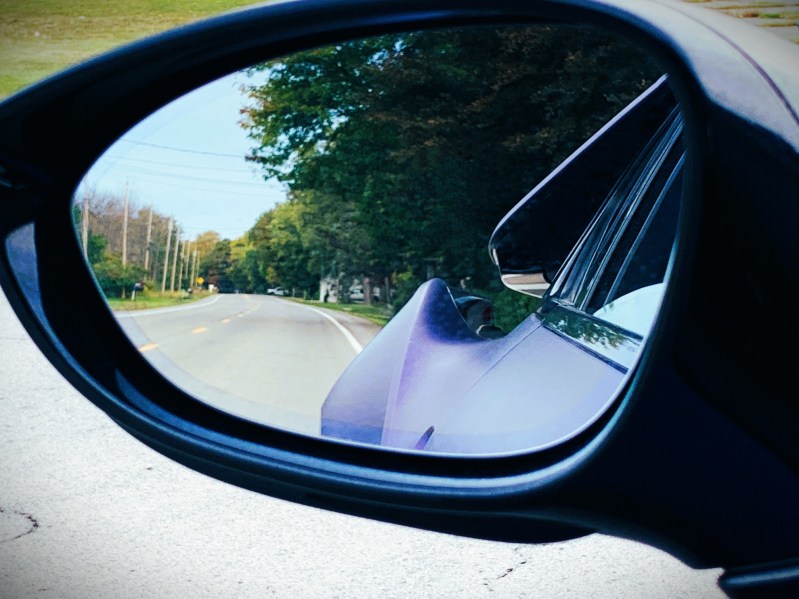
Was the BMW i8 front-wheel, rear-wheel, or all-wheel drive?
Yes. Those kooky BMW engineers were just showing off when it came to the i8. There were three separate drive modes to choose from: Comfort, ECO Pro, or Sport. In Comfort mode, the i8 defaults to electric and employs the gas engine as needed. ECO Pro allowed the i8 computer system to manage battery usage and modulate shift points to maximize energy efficiency. Much like Comfort, ECO predominantly relies on electricity as its primary power supply, using gas as a secondary source.
Even in the two softer settings, it becomes quickly apparent that the BMW i8 has exactly zero body roll. The carbon fiber monocoque chassis is so stiff it wouldn’t be surprising to find the gas tank filled with liquid Viagara. But, much like its lesser siblings, the i8’s throttle response borders on mushy… so much so, in fact, that in the first few miles in Comfort, we began to think something was actually wrong with the car because moving the throttle almost twenty percent of its travel resulted in virtually no reaction from what we knew to be a nigh-400 hp sports car.
We knew this car was a sub-five second 0-60 mph machine. Still, in ECO or Comfort mode, things began to get extremely uncomfortable when an outmoded Cadilac Catera zigs by with seeming ease, and you’re left wondering if maybe there needs to be an ‘M’ version of this car in the works. With a little patience and a bit more awareness, we finally picked up what the i8 was putting down.
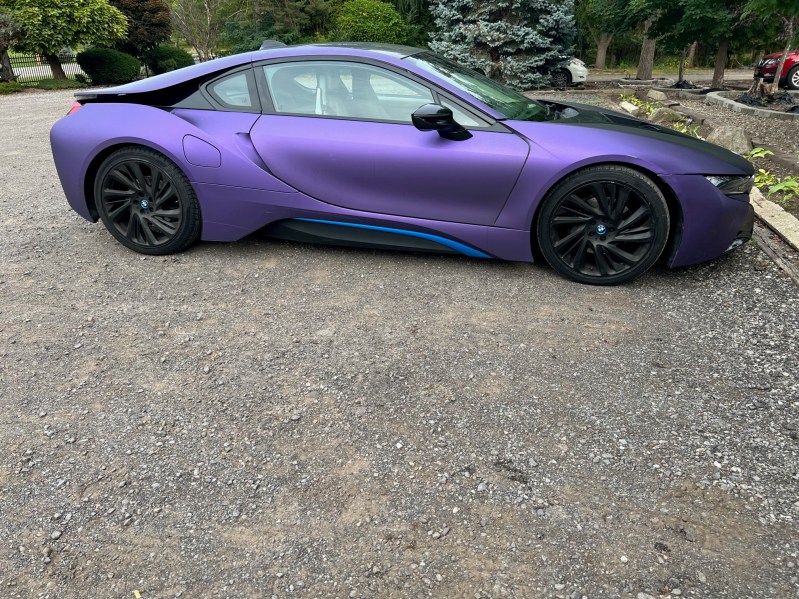
A quick search on Reddit or BMW forums will result in more than one original i8 owner sheepishly (and bravely) asking how exactly to engage the necessary Sport mode on this car. But, like most owners, we consider ourselves fluent in the world of sports cars… after all, we are professionals in this arena. However, the trick the i8 plays is that while the Comfort and ECO Pro mods are engaged with their respective button on the gearshift’s left side, the Sport mode button is nowhere to be found.
While we would love to confidently announce that we deduced the Sport mode mystery with some level of mental acuity, the truth is our hand accidentally bumped the shifter, and it kicked the car into Sport mode. Yup, like we said… professionals.
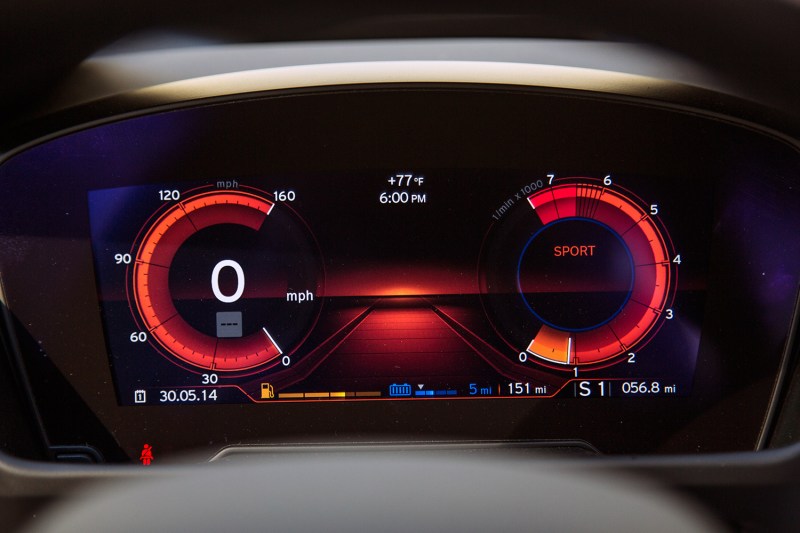
Once the palm was removed from our face, our pulse began to race even faster than the car itself, as the thrill of finally finding the real BMW i8 took over. Instantly three out of five senses instantly begin assimilating a cascade of new stimuli as the i8 transforms from Dr. Jeykll to Mr. Hyde. The relaxed blue-and-white vibe of the passive modes vanishes, and in its place, a vibrant, firey, reddish-orange glow sparks to life and permeates the cabin.
The “rumble” of the engine suddenly sounds much louder and throatier thanks to the controversial sound piped into the cabin via the stereo. In theory, we hate this. Fake sound? No. That’s just blasphemy, and it flies in the face of every red-blooded muscle car we’ve ever driven.
However… in practice, the faux auditory mirage BMW plays on us actually feels more real than when it isn’t there. Behind the wheel of a car, as exotic looking as the i8, the snarl resonating off your eardrums is the missing piece that completes the puzzle. The visceral force that this car elicits needs an audio component to perfect this car’s hyper-personality and really should be the sound the i8 makes all the time.
And while the sound may be slightly artificial, there is nothing fake about the steering and throttle responses that get ratcheted up to ten. Sport mode throws caution and electric frugality to the wind, tapping into all aspects of the hybrid power train to maximize power and performance above all else.
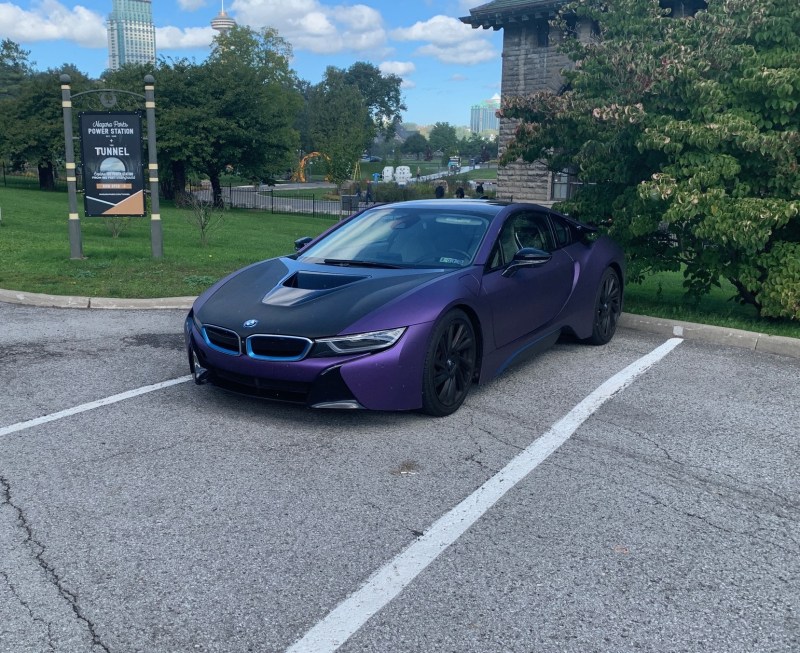
How fast is the BMW i8?
While the i8 was often criticized for not being fast enough, we would politely like to disagree. Sure, compared to the unconscionable mind-bending speed of hyper-hybrids like the LaFerrari, Porsche 918 Spyder, or McLaren P1, just about anything would be considered slow this side of an SR-71 Blackbird.
But internet trolls aside, from behind the wheel of an i8, the world can zip by as fast as you want… certainly quicker than any local law enforcement would care for. Strap in, remember how to put this Bimmer into Sport mode, check your mirrors, tighten your grip on the steering wheel, and you’re ready. If, like us, you chose to try your hand (literally) in manual shifting mode, it is best if you think about shifting from 1st to 2nd gear before you even hit the gas.
That tiny turbocharged three-cylinder may be diminutive at just 1.5 liters, but thanks to 25 pounds of boost, it manages to make a whopping 152 hp per liter, which, at the time of its production, was the highest specific output BMW had ever created.
Stomp the go-pedal, and the BMW i8 wastes zero time with antiquated wheelspin and leaps forward with the fervor of a hungry cheetah charging an unsuspecting gazelle on the Serengeti. Your mind doesn’t bother second-guessing the growl emanating from the speakers because your eyes are too focused on the digital tachometer ripping up to its 6,500 rpm redline while the outside world becomes a peripheral blur as 100 mph comes calling in less than ten seconds.
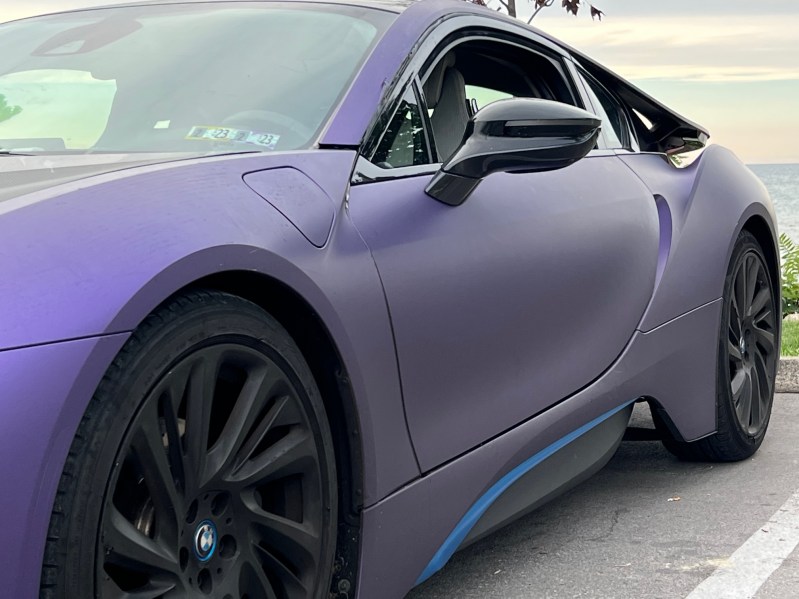
The combination of being a low-slung 3,484-pound rocket as well as having the bulk of its drivetrain weight sitting directly over the rear wheels, not to mention the added benefit of the front wheels jumping in to help grab the tarmac and “slow,” is a word associated only with the cars fading into nothingness in the rearview mirror.
While we didn’t have our official test gear on hand for this drive, Car and Driver did when they tested the i8 new in 2014, and it sprinted from 0-60 mph in a scant 3.8 seconds, 0-100 mph in just 9.6 seconds, and through the quarter mile in 12.4 seconds at 113 mph, on its way to a governor limited 155 mph. Judging by the age-old stopwatch method, we can confirm that those numbers are easily (and consistently) attainable, and we have Joker-like smile lines all but tattooed on our face to prove it.
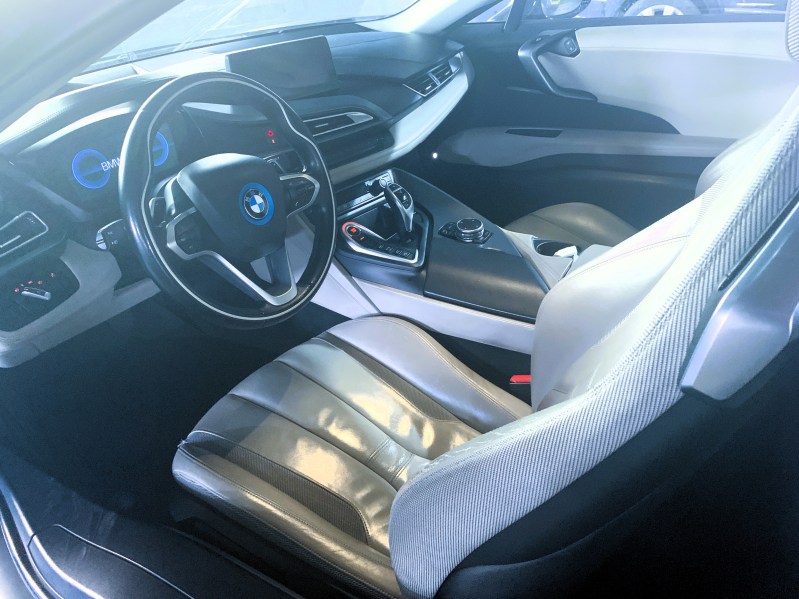
How much is the BMW i8?
As with any true Halo car, the i8 was not cheap when it debuted in what is already a decade ago. Being the forward-thinking futuristic centerpiece of an iconic brand like BMW comes with a fairly substantial price tag. When it was introduced in 2014, BMW set the base MSRP for an i8 at $136,625, unless, of course, you decided to opt for the $20,000 carbon fiber Louis Vuitton luggage set that was made specifically to fit inside the i8’s unique truck layout.
For our money, we would forgo the cool suitcases and drop that extra 20k on the 2019 i8 Roadster, which stickered for a cool $164,295. Today, however, according to Classic.com, a used i8 can range anywhere from about $60,000 to $96,000, depending on year, options, and condition.
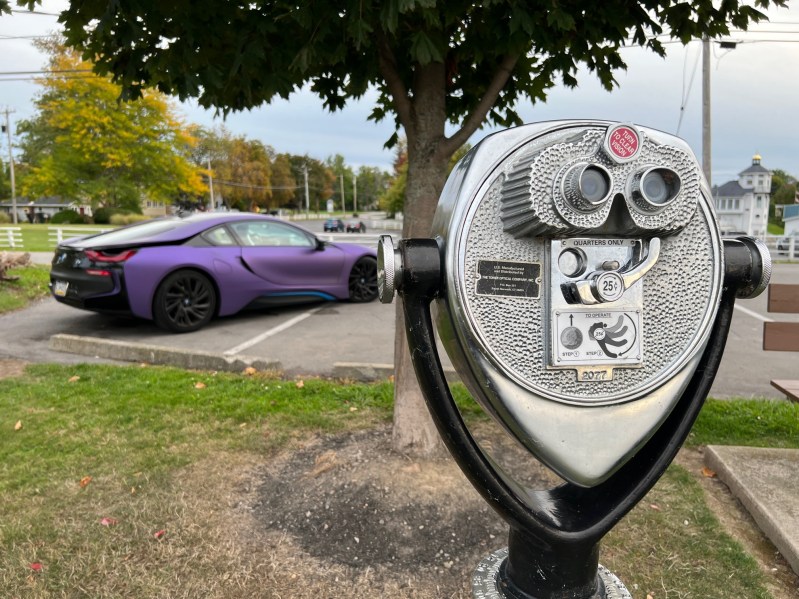
What made the BMW i8 special?
In many ways, driving a BMW i8 is like dating a Kardashian. Show up anywhere, and you are instantly famous. It doesn’t matter if you’re in sweatpants pumping gas at a no-name station or stopping in the Poconos at midnight for a burger and a beer; flap open one or both of the i8’s butterfly doors and instantly, you are the center of attention. Depending on the crowd that gathers, you can feel a mix of admiration, judgment, disbelief, criticism, shock, envy, and awe.
Exit the i8 dressed in a clean but unassuming outfit, and we can personally attest that some men and women want to get to know you, while others want to be you, and children everywhere want to crown you king. But, like being with Kim, Khloe, or Kourtney, your main objective is to just get out of the way and not ruin any of the pictures being taken of your beautiful companion.
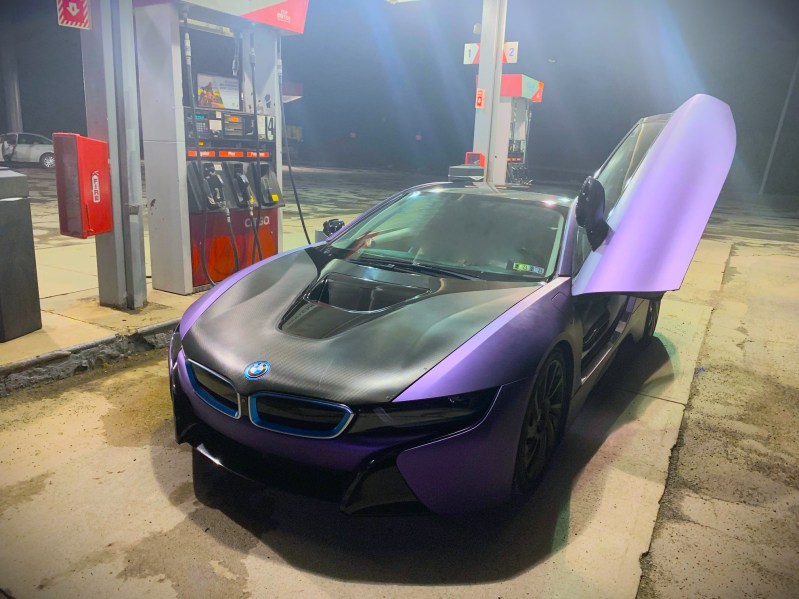
Aside from being glamorously stop-you-in-your-tracks gorgeous, the i8 was the first car in history to be front-wheel drive, rear-wheel drive, and all-wheel drive. Beyond that, the i8 represented a milestone in the automotive timeline. Up until BMW’s innovative supercar debuted, having a hybrid meant sacrificing speed and agility in favor of fuel efficiency and practicality.
But the i8 bridged the gap between those two ideologies and showed us the road to the future can be one paved with higher expectations, stellar technology, and plenty of speed. Thanks to a combination of brilliant engineering, a passion for driving, and a focus on the future, this car is a fantastically fun machine that is far greater than the mere sum of its parts. It seems fitting that the BMW i8, being a hybrid, is the epitome of synergy, and a first-class ticket to a fun-filled future.



